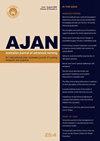Australian nurses’ satisfaction and experiences of redeployment during COVID-19: A cross-sectional study
IF 1.3
4区 医学
Q3 NURSING
引用次数: 0
Abstract
Objective: To evaluate nurses’ satisfaction and experiences of redeployment during COVID-19. Background: Redeployment to an unfamiliar environment can be challenging; however, it can also present an opportunity for staff to learn new skills. During the COVID-19 pandemic, the need to redeploy health professionals, particularly nurses, increased dramatically. Evaluating nurses’ satisfaction and experiences related to redeployment during the pandemic is essential for future surge planning. Methods: A cross-sectional online survey consisting of single-choice and open-ended questions was conducted on a purposive sample of nurses (n=106) working in an acute hospital in New South Wales, Australia, from July to August 2020. Nurses who were redeployed to wards different from their regular workplaces were invited to participate in the survey. Areas of redeployment include various medical and surgical wards, intensive care units and the emergency department. Nurses’ satisfaction was obtained through the survey question structured as a Likert scale ranging from very satisfied to very dissatisfied. Nurse experiences were captured through a single-choice question (positive or negative experience) and open-ended questions. The single-choice questions were analysed by summarising participant responses, and open-ended questions were analysed using an iterative thematic analysis approach. Results: A high proportion of nurses were either neutral (48.4%, n=45) or dissatisfied (44.1%, n=41) with redeployment, with only 7.5% (n=7) of nurses being satisfied. There was a mix of positive (43%, n=40) and negative (57%, n=53) redeployment experiences. Three main themes influence nurses’ redeployment experience: “staff friendly and welcoming”, “patient allocation”, and “support”. Conclusion: Redeployment of healthcare workers during a pandemic is inevitable. This study highlighted that despite close to half of the redeployed nurses reporting a positive redeployment experience, only a few were satisfied with redeployment. This indicated that more work is required to support nurses during redeployment to increase satisfaction. Future workforce redeployment needs to consider healthcare workers’ needs and must strive to improve satisfaction to build a sustainable and resilient health system. Implications for research, policy, and practice: This study highlighted that although redeployment is challenging, staff can have a positive redeployment experience when supported. Elements that are associated with positive redeployment experience were explored in this study, which can inform policy and prepare nurses for future surge demand. What is already known about the topic? Redeployment of nurses in the acute care sector during the COVID-19 pandemic is common. Both the COVID-19 pandemic and redeployment can be challenging and stressful experiences for nurses. There is a paucity of research examining the satisfaction and experiences of nurses working in the acute care sector during COVID-19 in Australia. What this paper adds: This study provides evidence that many nurses working in the acute sector during COVID-19 in Australia had positive redeployment experiences. Despite this, very few were satisfied with redeployment. This study has identified essential factors to a positive redeployment experience. This study also highlighted the need to improve澳大利亚护士在COVID-19期间的满意度和重新部署经验:一项横断面研究
目的:了解新冠肺炎疫情期间护士的满意度和再调配经验。背景:重新部署到不熟悉的环境可能具有挑战性;然而,它也可以为员工提供学习新技能的机会。在2019冠状病毒病大流行期间,重新部署卫生专业人员,特别是护士的需求急剧增加。在大流行期间评估护士的满意度和与重新部署相关的经验对于未来的激增规划至关重要。方法:对2020年7月至8月在澳大利亚新南威尔士州一家急症医院工作的护士(n=106)进行了一项由单选和开放式问题组成的横断面在线调查。被调往不同工作地点病房的护士被邀请参与调查。重新部署的地区包括各种内科和外科病房、重症监护病房和急诊科。护士的满意度是通过李克特量表从非常满意到非常不满意的调查问题来获得的。通过单选问题(积极或消极的经历)和开放式问题捕捉护士的经历。通过总结参与者的回答来分析单选题,使用迭代主题分析方法分析开放式问题。结果:对调动持中立态度(48.4%,n=45)和不满意态度(44.1%,n=41)的护士比例较高,满意的护士仅占7.5% (n=7)。有积极(43%,n=40)和消极(57%,n=53)的重新部署经验。三个主要主题影响护士的重新部署经验:“员工友好和欢迎”,“病人分配”和“支持”。结论:在大流行期间重新部署卫生工作者是不可避免的。这项研究强调,尽管近一半的重新部署护士报告了积极的重新部署经验,但只有少数人对重新部署感到满意。这表明需要更多的工作来支持护士在重新部署,以提高满意度。未来的人力资源重新部署需要考虑卫生工作者的需求,必须努力提高满意度,以建立一个可持续和有弹性的卫生系统。对研究、政策和实践的启示:该研究强调,尽管重新部署具有挑战性,但在支持下,员工可以获得积极的重新部署体验。本研究探讨了与积极调动经验相关的因素,这可以为政策提供信息,并为护士未来的激增需求做好准备。关于这个话题我们已经知道了什么?在2019冠状病毒病大流行期间,在急症护理部门重新部署护士是很常见的。COVID-19大流行和重新部署对护士来说都是充满挑战和压力的经历。在澳大利亚,关于COVID-19期间在急症护理部门工作的护士的满意度和经验的研究很少。本文补充:本研究提供的证据表明,在澳大利亚COVID-19期间,许多在急性病部门工作的护士都有积极的重新部署经历。尽管如此,很少有人对重新部署感到满意。这项研究确定了积极调动经验的基本因素。这项研究也强调了改进的必要性
本文章由计算机程序翻译,如有差异,请以英文原文为准。
求助全文
约1分钟内获得全文
求助全文
来源期刊
CiteScore
2.30
自引率
7.10%
发文量
27
审稿时长
>12 weeks
期刊介绍:
The Australian Journal of Advanced Nursing publishes a wide variety of original research, review articles, practice guidelines, and commentary relevant to nursing and midwifery practice, health- maternity- and aged- care delivery, public health, healthcare policy and funding, nursing and midwifery education, regulation, management, economics, ethics, and research methodology. Further, the journal publishes personal narratives that convey the art and spirit of nursing and midwifery.
As the official peer-reviewed journal of the ANMF, AJAN is dedicated to publishing and showcasing scholarly material of principal relevance to national nursing and midwifery professional, clinical, research, education, management, and policy audiences. Beyond AJAN’s primarily national focus, manuscripts with regional and international scope are also welcome where their contribution to knowledge and debate on key issues for nursing, midwifery, and healthcare more broadly are significant.

 求助内容:
求助内容: 应助结果提醒方式:
应助结果提醒方式:


